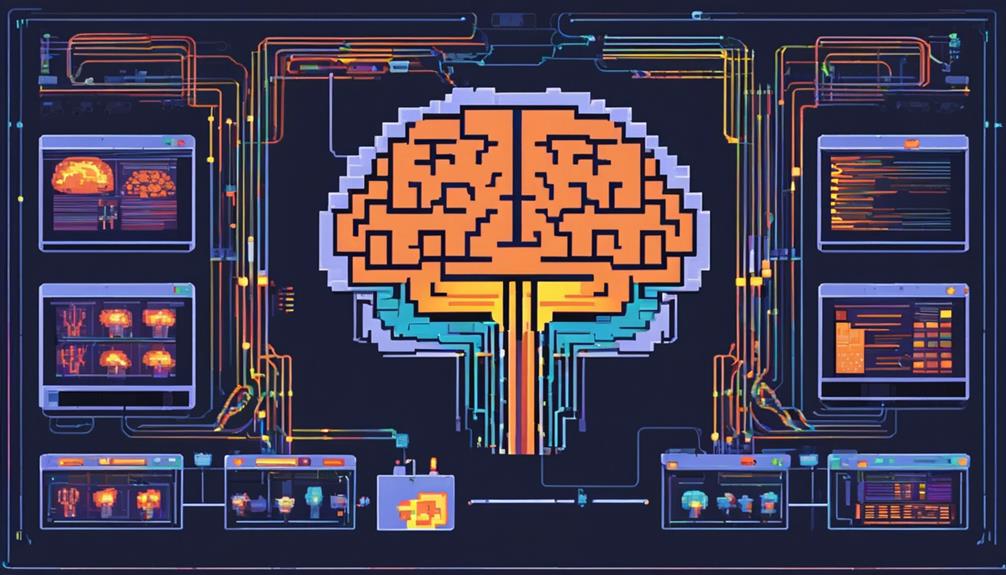Embark on a journey into extreme evolution through hyper self-improvement. Uncover the power of neuroscience in shaping expectations, goal strategies, and coping tactics. Learn how breaking down tasks boosts confidence, supportive environments fuel progress, and discomfort drives growth. Clear goals, supportive relationships, and organized spaces enhance focus and productivity. Celebrate milestones to reinforce positive habits and sustain motivation. Aligning expectations with objectives cultivates a potent growth framework. Dive deeper into the domain of sustainable self-development by understanding the intricate balance of mental health and self-improvement. Explore the nuances of excessive self-awareness and therapeutic interventions for a holistic approach.
Key Takeaways
- Understanding the neuroscience behind hyper self-improvement.
- Identifying signs of excessive self-awareness in self-improvement.
- Coping strategies for managing hyper self-awareness.
- Impact of excessive self-awareness on mental health.
- Therapeutic approaches to balance hyper self-improvement.
Neuroscience and Expectations
In exploring hyper self-improvement, understanding how neuroscience influences expectations is essential for maximizing your growth potential. Expectations greatly impact your behavior, experiences, and thoughts along your self-improvement journey.
Your brain processes information based on these expectations, directly influencing your performance and the outcomes you achieve. It's vital to modify your expectations to overcome any barriers hindering your growth and change.
When your expectations are misaligned, you may face resistance to your self-improvement efforts. By recognizing and adjusting your expectations, you play a pivotal role in achieving personal growth and development.
Self-Improvement Strategies

Exploring self-improvement strategies involves implementing effective tactics that propel you towards your goals and foster personal growth. One key strategy is to break down your goals into smaller, more manageable tasks. By dividing your objectives into achievable milestones, you can track your progress, stay motivated, and build confidence as you move forward.
Setting big, audacious goals can trigger dopamine release, providing the motivation needed to pursue self-improvement actively. Additionally, creating a supportive environment for success is pivotal in aiding goal achievement. This environment signals expectations to your brain, reinforcing your commitment to self-improvement.
Leveraging neuroscience concepts can further enhance the effectiveness of your self-improvement efforts, leading to sustainable growth over the long term. Embracing discomfort and challenges is also essential for personal development, as it pushes you out of your comfort zone and fosters continuous improvement.
Setting Success Environment

Creating a conducive environment for success involves establishing clear goals and eliminating distractions to enhance focus and productivity. In the pursuit of personal development and mental health, setting up a success environment is essential. Here are some key elements to keep in mind:
| Success Environment Features | Benefits |
|---|---|
| Clear Goals | Provides direction and purpose |
| Supportive Relationships | Boosts motivation and accountability |
| Organized Workspace | Reduces clutter and mental load |
Goal Setting and Achievement

When setting goals, aiming for ambitious targets can trigger a sense of achievement and motivation, thanks to the release of dopamine in your brain.
By breaking these larger goals into smaller, manageable milestones, you can build confidence and maintain momentum towards your ultimate objectives.
Celebrating the completion of these milestones not only provides a sense of accomplishment but also reinforces positive behaviors, encouraging you to keep progressing towards your goals.
Milestone Momentum
Building momentum through achieving milestones is essential for sustaining motivation and progress in your self-improvement journey. By incorporating consistent goal-setting practices, you create a roadmap for your development.
Setting specific, grandiose goals triggers dopamine release, boosting your drive for hyper self-improvement. However, it's the smaller milestones that truly propel you forward. Each achievement along the way provides a dopamine reward, reinforcing your progress and keeping you on track.
Reaching these milestones not only signifies progress but also builds your confidence and momentum. The sense of accomplishment fuels further self-improvement efforts, creating a cycle of growth and development.
Dopamine Rewards
To optimize your self-improvement journey, embrace the dopamine rewards that come with setting and achieving goals. When you set specific, ambitious goals, your brain releases dopamine, fueling your motivation for self-improvement.
As you reach smaller milestones on your way to your ultimate goal, you receive dopamine rewards that reinforce your positive efforts. These rewards not only boost your confidence but also help you build momentum in your journey towards self-improvement.
Utilizing Neuroscience

Understanding how neuroscience influences self-improvement is essential to optimizing your growth journey. When it comes to setting your standards for personal development, neuroscience plays a pivotal role. Research shows that the brain's response to expectations significantly impacts your behavior and thoughts along the self-improvement path. By aligning your expectations with your goals, you create a potent framework for progress.
Emotional intelligence also comes into play here, as being aware of your emotions and how they influence your expectations can lead to more effective self-improvement strategies.
Moreover, neuroscience reveals that when expectations are met, the brain releases dopamine, a neurotransmitter associated with pleasure and reward. This dopamine release not only makes achieving milestones exciting but also reinforces positive behaviors, driving you to continuously work for growth.
Types of Self-Awareness

Internal self-awareness involves recognizing your thoughts, emotions, and behaviors at a deeper level, while external self-awareness focuses on understanding how others perceive and interact with you.
These two aspects of self-awareness play essential roles in personal growth, problem-solving skills, and emotional intelligence enhancement.
Striking a balance between internal and external self-awareness is pivotal for maintaining overall well-being and emotional stability.
Internal Self-Recognition Aspects
Recognizing your own thoughts, emotions, and behaviors is essential for achieving internal self-awareness. This type of self-awareness is vital for personal growth and self-improvement. By understanding your motivations and desires, you can pinpoint areas for development and work towards positive change. Developing internal self-awareness can lead to increased emotional intelligence and better decision-making skills.
When you're in tune with your thoughts and emotions, you can navigate challenges more effectively and make choices that align with your values and goals. Self-recognition aspects allow you to assess your strengths and weaknesses objectively, paving the way for continuous improvement. Embracing internal self-awareness empowers you to take charge of your personal growth journey and make meaningful strides towards becoming the best version of yourself.
External Perception Understanding
To fully comprehend the concept of self-awareness, it's essential to explore the domain of how others perceive and engage with you, known as external self-awareness. This aspect focuses on social interactions and how your behavior, emotions, and thoughts are interpreted by those around you. Understanding external perception plays a pivotal role in self-improvement, as feedback from others can provide valuable insights into areas where growth is needed.
Positive aspects of external self-awareness include the opportunity for personal development and enhanced relationships through better communication and empathy.
Conversely, negative aspects can manifest in feelings of isolation or worthlessness if one becomes overly reliant on external validation. Hence, finding a balance between internal and external self-awareness is key for mental well-being and fostering healthy relationships.
Signs of Excessive Awareness

Excessive self-awareness often manifests through constant self-criticism, overanalyzing past mistakes, and feeling overwhelmed by the pursuit of self-improvement. This heightened focus on your weaknesses can greatly impact your overall well-being. By fixating on what you perceive as flaws, you may overlook your strengths, leading to a skewed perspective of yourself.
Struggling with decision-making and feeling pressured to meet unrealistic standards are common signs of excessive awareness. These challenges can also spill over into social situations, causing difficulties in interactions with others.
Moreover, physical symptoms like insomnia, fatigue, and anxiety may arise from the stress of constantly critiquing yourself. This negative self-perception can create a cycle of increased stress levels and a persistent feeling of inadequacy.
The constant comparison to others, fear of failure, and the need for external validation are indicators that your self-awareness might be veering into unhealthy territory. Recognizing these signs is the first step towards finding a healthier balance in your self-improvement journey.
Coping Strategies

Consider incorporating mindfulness techniques and engaging in physical activities to combat hyper self-awareness and promote a healthier mindset.
When dealing with excessive self-awareness, it's important to have coping mechanisms in place to maintain your mental well-being. Here are some strategies to help you navigate this challenge:
- Practice mindfulness: Use deep breathing and meditation to stay grounded in the present moment.
- Engage in physical activities: Participate in hobbies or exercises that can help you enter flow states, redirecting your focus away from over-analysis.
- Seek professional support: Consider therapy to understand the root causes of hyper self-awareness and develop effective coping strategies.
- Challenge negative thoughts: Work on changing self-critical narratives through cognitive exercises to foster self-compassion.
- Prioritize self-care: Implement activities like journaling, gratitude exercises, and setting boundaries to boost self-esteem and reduce self-criticism.
Balancing Mental Health

Recognizing the impact of excessive self-awareness on your well-being is vital when working towards hyper self-improvement.
By incorporating emotional intelligence into your journey, you can effectively manage any negative effects on your mental health.
Engaging in activities that promote both mental and physical well-being will help strike a balance between your self-improvement goals and your mental health.
Self-Awareness Impact
Balancing mental health in the domain of self-awareness involves fostering emotional intelligence to manage negative self-talk effectively.
Excessive self-awareness can lead to mental health issues like Borderline Personality Disorder (BPD).
To address this, cognitive behavioral therapy (CBT) is effective in identifying and changing unhelpful thoughts and behaviors associated with hyper self-awareness.
Additionally, engaging in hobbies can provide an outlet for negative emotions, contributing to a balanced mental and physical well-being.
Challenging unhelpful thought patterns through social interaction can help combat feelings of isolation and disconnection stemming from hyper self-awareness.
Ultimately, developing emotional intelligence through techniques like CBT and finding healthy outlets for emotions can greatly impact how self-awareness influences mental health.
Mental Health Balance
Managing your mental health while pursuing hyper self-improvement involves maintaining a delicate equilibrium between self-awareness and well-being. Excessive self-awareness can sometimes lead to negative impacts on your mental health. To navigate this balance effectively, utilizing emotional intelligence is key. Understanding your emotions and how they influence your thoughts and actions can help you stay grounded while pushing yourself towards self-improvement goals.
Engaging in hobbies and activities can provide a healthy outlet for managing intense self-improvement efforts and maintaining mental balance. These activities offer a break from the constant self-analysis and allow you to relax and recharge.
Additionally, seeking therapeutic approaches such as cognitive behavior therapy can assist in identifying and addressing harmful thought patterns associated with extreme self-awareness.
Coping Strategies Integration
To maintain a healthy mental balance while integrating coping strategies, focus on implementing self-care routines that prioritize your emotional well-being.
Here are some effective ways to enhance your coping mechanisms:
- Utilize mindfulness techniques to ground yourself in the present moment and reduce excessive self-awareness.
- Practice self-compassion to counteract negative self-talk and promote a healthier self-image.
- Engage in physical activities or hobbies to distract yourself from overthinking and foster a sense of accomplishment.
- Seek professional help or therapy to address deep-rooted issues contributing to excessive self-awareness.
- Build a strong support network of friends, family, or a therapist to provide guidance and encouragement in managing self-awareness challenges.
Therapeutic Approaches

Effective therapeutic approaches can help individuals address the negative impacts of hyper self-improvement on their mental health. Therapeutic interventions, such as cognitive behavior therapy, can assist in identifying and modifying unhelpful thoughts and behaviors associated with extreme self-awareness. These interventions can be particularly beneficial for managing conditions like Borderline Personality Disorder (BPD) that may be exacerbated by excessive self-improvement efforts.
Furthermore, social interaction and support play a pivotal role in mitigating the adverse effects of hyper self-improvement. Engaging with others can help challenge unhelpful thought patterns, provide emotional support, and foster a sense of well-being. Sharing personal experiences and coping strategies within a supportive community can aid individuals in finding a balance between their mental and physical health.
Additionally, participating in hobbies and activities can offer a healthy outlet for managing negative emotions and maintaining equilibrium while working towards self-improvement.
Frequently Asked Questions
Why Am I so Hyper Aware of My Existence?
You're hyper-aware of your existence due to a heightened focus on flaws, leading to feelings of isolation. To cope, let go of over-analysis, focus on strengths, and embrace imperfections. Balancing self-awareness is key for mental health.
Is It Normal to Be Extremely Self-Aware?
It's common to have periods of high self-awareness, but being extremely self-aware can harm your mental well-being. Try focusing on your strengths, letting go of perfectionism, and avoiding constant comparison with others for a healthier mindset.
Are People With ADHD Hyper Self-Aware?
Yes, people with ADHD can be hyper self-aware. This heightened sensitivity to thoughts and actions may lead to overthinking, self-criticism, and increased stress. Understanding this connection is essential for providing support and interventions to manage these challenges effectively.
What Does It Mean When a Therapist Says You're Self-Aware?
When a therapist says you're self-aware, it means they see your ability to understand your thoughts, feelings, and actions. This recognition shows introspection and insight, indicating potential for growth and improvement in therapy and overall well-being.
What are the key factors in extreme self-improvement and how does it differ from traditional self-improvement methods?
Extreme self-improvement requires unwavering dedication and a willingness to push oneself beyond normal limits. This approach focuses on rapid, drastic changes and places heavy emphasis on mindset and resilience. In contrast, traditional self-improvement methods often involve gradual progress and a more structured, incremental approach to personal development. The essence of selfimprovement evolution lies in the intensity and speed of transformation.
What Are the Key Differences Between Hyper Self-Improvement and Traditional Self-Improvement?
Hyper self-improvement focuses on rapid and intense changes, while traditional self-improvement involves gradual and sustainable progress. The essence of selfimprovement lies in the approach: hyper emphasizes quick results, while traditional emphasizes long-term growth. Both methods have their merits, but their fundamental differences lie in their intensity and pacing.
Conclusion
To sum up, delving into hyper self-improvement through neuroscience and self-improvement strategies can lead to significant personal growth.
It's crucial to set realistic goals, create a supportive environment, and utilize therapeutic approaches to maintain mental health.
While aiming for extreme evolution can be advantageous, it's essential to recognize signs of excessive awareness and implement coping strategies to achieve a healthy balance.
Remember, self-improvement is a journey, not a race.









